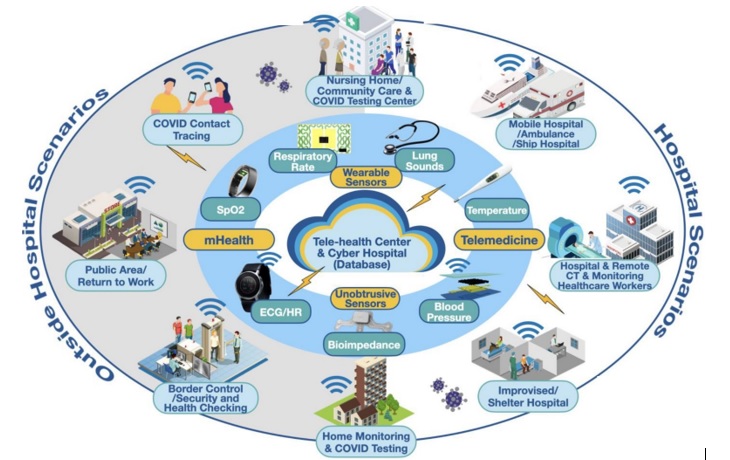Health Technology Ecosystem to Tackle Cardiovascular Diseases
Cardiovascular disease (CVD) is the world’s leading killer. To address this health challenge, Professor Zhang Yuanting, Chair Professor of Biomedical Engineering at CityU, is leading a health engineering team to develop ground-breaking health technologies, from wearable sensing devices to artificial-intelligence (AI)-based early diagnostic and monitoring systems. His long-term goal is to establish an innovative health technology system for effective disease prevention and therapy in Hong Kong and beyond.
According to the World Health Organization, cardiovascular diseases, including strokes, are the number one cause of death globally, claiming an estimated 17.9 million lives every year. There are a variety of heart and blood vessel disorders, including coronary heart disease, stroke and vascular dementia. They have remained the major causes of morbidity and mortality globally in the past 15 years, and it is estimated that the increasing trend of CVDs will continue.
“Despite major advances in the treatment of CVDs, a large number of patients appear to be healthy but suddenly die without any prior symptoms. A major cause of this sudden death is the rupture of vulnerable plaque in an artery, blocking the blood flow and leading to heart attack or stroke,” explained Professor Zhang. “However, there are insufficient screening and diagnostic methods to identify such at-risk patients before the tragedy happens, so it is difficult to provide prevention or medical treatment in a timely manner.”

Wearable sensing devices for disease monitoring
Professor Zhang’s research focuses cover cardiovascular health engineering, as well as unobtrusive sensing and wearable devices. Together with collaborators from top universities and research institutes, his team is working on interdisciplinary studies to address the major gaps in early diagnosis and condition management of CVDs.
In particular, they are working on the development of wearable, soft sensing devices, made of flexible and stretchable materials, together with a system that can monitor cardiovascular condition and associated risks based on physiological models and information fusion with medical imaging and other biomarkers.
They are developing affordable biomedical devices that are highly sensitive to CVD-related biomarkers, so that more people can have access to this useful technology for CVD prevention. “These wearable devices can help us identify the CVD risks as early as possible,” he said.
To enhance the early screening of at-risk patients, they are also investigating new imaging technologies for more precise evaluation of vulnerable plaque.
Given the complex medical data collected from these monitoring devices and screening tools, a system is needed to put them together for analysis and evaluation. Therefore, the team is designing an AI-based platform for integrating all the CVD markers for early prediction and diagnosis of acute CVDs. They are also developing a closed-loop drug-delivery device based on wearable technologies for vascular intervention and therapy to provide timely treatment for acute CVD patients. In the long run, Professor Zhang hopes to build an integrated system of cardiovascular health technology for effective disease prevention and therapy in Hong Kong and the Greater China region.
International joint study on mobile health tech
Earlier, Professor Zhang participated in a 60-person expert task force organised and led by a team fromthe Harvard Medical School, which published a joint study on how mobile health technologies can help mitigate the effects of the Covid-19 pandemic. The task force identified technologies that could be deployed in response to the Covid-19 pandemic and would likely be suitable for future pandemics. They found that wearable-based mobile health technologies are viable options for monitoring Covid-19 patients who are instructed to self-quarantine at home or who have mild symptoms and undergo monitoring in community treatment facilities. They can be used to predict symptom escalation for intervention as early as possible.
“To mitigate and control diseases effectively, whether it is Covid-19 or CVDs, there is an urgent need to develop an innovative health management system that can integrate different health technologies, such as wearable health monitoring devices, biosensors, medical imaging and AI. This will enable early prediction and detection, as well as early diagnosis and intervention, for disease prevention and management,” said Professor Zhang.
This research article originated from CityU RESEARCH.